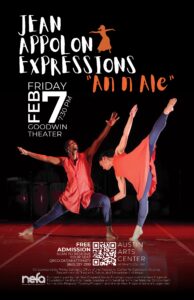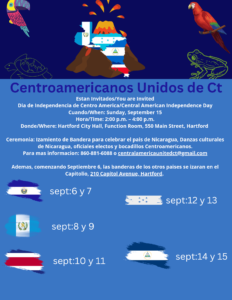Spring 2025
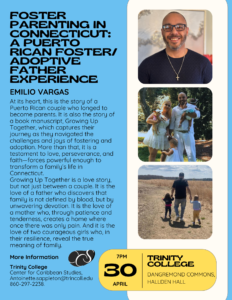
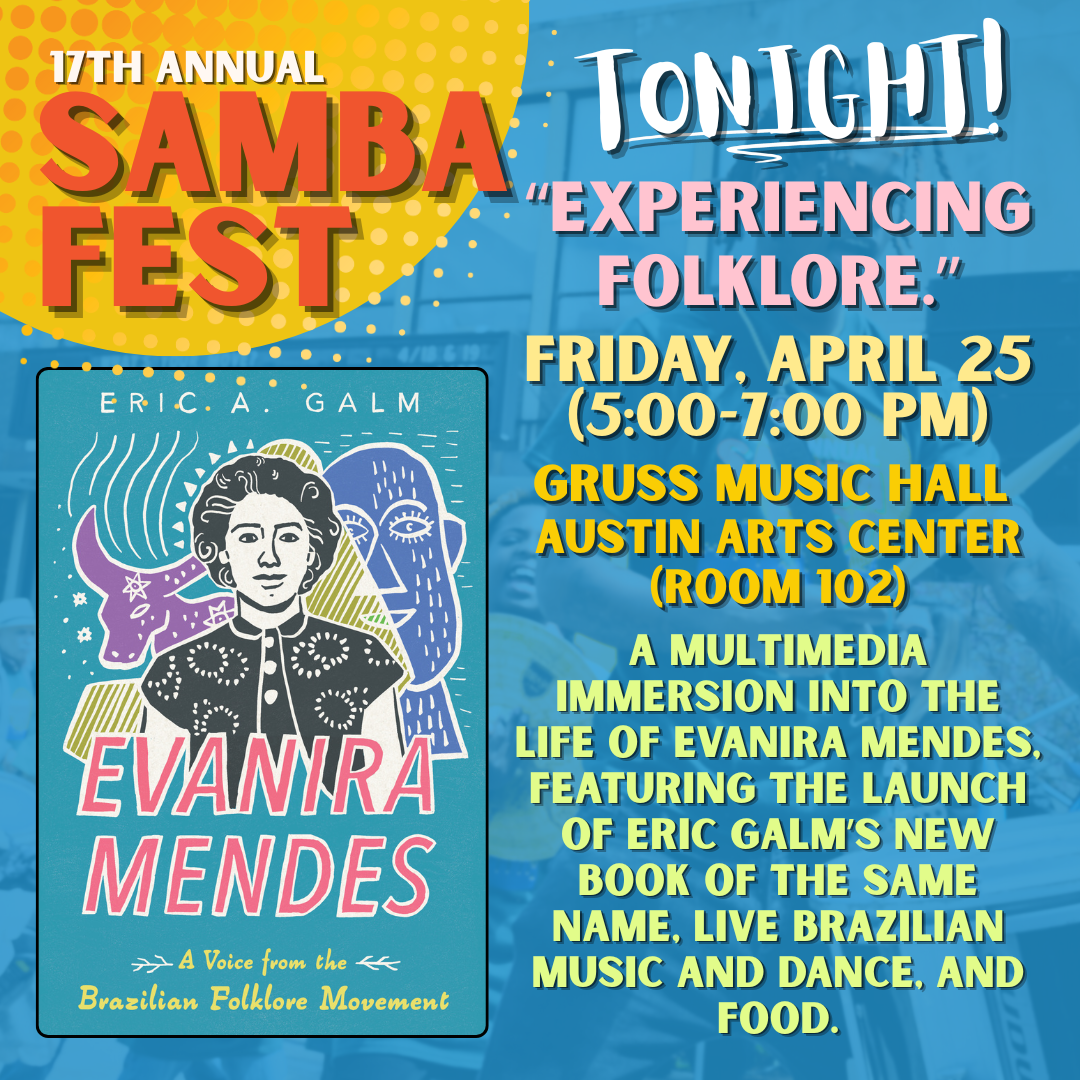
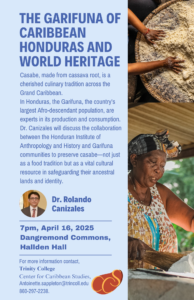
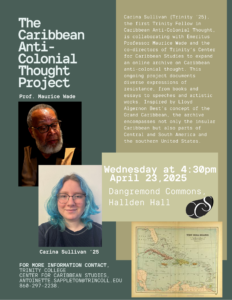
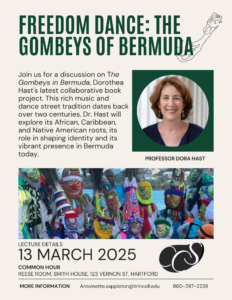
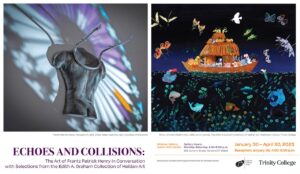
Fall 2024
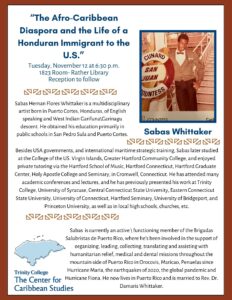
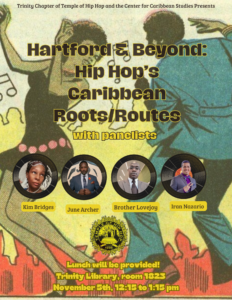
Spring 2024
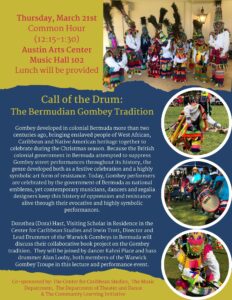
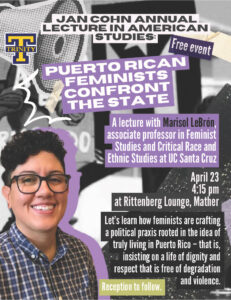
Spring 2023
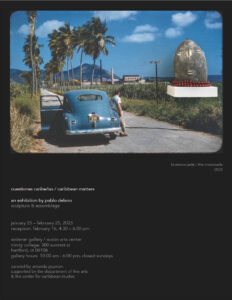
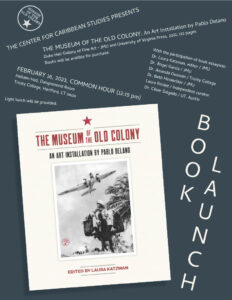
Fall 2022
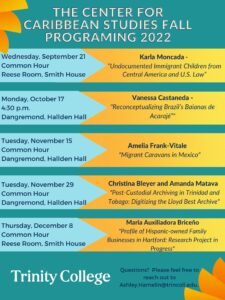
Thursday, December 8 2022
Reese Room, Smith House
Common Hour
Maria Auxiliadora Briceño: “Profile of Hispanic-owned Family Businesses in Hartford: Research Project in Progress”
Tuesday, November 29 2022
Dangremond, Hallden Hall
Common Hour
Christina Bleyer and Amanda Matava:“Post-Custodial Archiving in Trinidad and
Tobago: Digitizing the Lloyd Best Archive”
Tuesday, November 15 2022
Dangremond, Hallden Hall
Common Hour
Amelia Frank-Vitale: “Migrant Caravans in Mexico”
In this talk, I discuss the history and trajectory of migrant caravans in Mexico, starting from the first, small gathering in 2011 through to the massive caravan of 2018 that made international headlines and drew the ire of then President Donald Trump. Drawing from ethnographic research on Central American transit migration conducted over the last decade, I define the caravan as a unique mix of accompaniment and protest and place it within the larger context of creative strategies of mobility that emerge as people adapt to the changing landscape of migration enforcement.
Monday, October 17, 2022
Dangremond, Hallden Hall
4:00 pm
Vanessa Castaneda:“Reconceptualizing Brazil’s Baianas de Acarajé”
“Baianas de acarajé are often referred to as the “postcards of Brazil.” These predominantly older, working-class Afro-Brazilian women are street vendors in Salvador, Brazil that sell typical regional foods with culinary origins in West Africa. They exist as central icons of regional and national identity within the Brazilian cultural imaginary and as such, have been rendered as apolitical stewards of an authentic past. Using interdisciplinary methodologies, including community-based ethnographic fieldwork and archival research, Dr. Castañeda reconceptualizes the baianas as political agents of Black feminism for self and collective liberation.
Wednesday, September 21, 2022
Reese Room, Smith House 12:15 pm
Karla Moncada :“Undocumented Immigrant Children from Central America and U.S. Law”
Spring 2022 Events
The Spring 2022 Caribbean Film Festival
Please join us Tuesdays at 7:00 p.m. in Mather Hall Wean Terrace room B/C to view the films. Stay after the films to engage in a brief discussion with the CCS
Co-directors Dario A. Euraque & Eric Galm and special hosts
*In accordance with Trinity College COVID protocols for public events, everyone is required to show proof of vaccination and photo ID at the door, and must wear a face mask at all times while inside the venue. Trinity IDs are accepted as proof of vaccination status
Please send all questions to: [email protected]
Spring 2022 CCS Film Festival lineup:
Cuba: “They Are We”
Tuesday, February 8th @ 7:00p.m
Running time: 1hr. 19 min.
Nearly 200 years after a family was split by the transatlantic slave trade, they were, remarkably reunited.
In Central Cuba, proud members of the Ganga-Longoba, a small Afro-Cuban ethnic group, have kept their unique heritage alive. Incredibly, through decades of brutal enslavement, independence wars, and then the denying of all religions after the revolution, they have retained a collection of distinct songs and dances that one of their ancestors brought from Africa as a slave. Each December 17th they still perform them at the San Lazaro ceremony. “They Are We” tells the story of the Ganga-Longoba and of the village their ancestor called home. It is the story of how, just very occasionally, a family separated by the slave trade can reunite for the good of all.
Dominican Republic: “Stateless”
Tuesday, February 15th @7:00 p.m.
Running time: 1hr 22min.
Director Michèle Stephenson’s new documentary follows families of those affected by the 2013 legislation stripping citizenship from Dominicans of Haitian descent, uncovering the complex history and present-day politics of Haiti and the Dominican Republic through the grassroots electoral campaign of a young attorney named Rosa Iris.
Haiti: “The Man by the Shore”
Tuesday, February 22nd @7:00 p.m.
Running Time: 1hr 47min.
A Small country town in Papa Doc’s Haiti. A period of bloody dictatorship during which entire families are wiped out, massacred, victims of an arbitrary regime. 8-year-old Sarah’s parents are forced to flee Haiti Under Duvalier. Sarah’s father, a discredited officer, entrusts Sarah and her two sisters to their grandmother. For the time being secure from the violent and impulsive Janvier, who is bent on Revenge and dedicated to the regime, Sarah creates a world of her own. A world full of fantasy, mystery and rituals. Thirty years later, Sarah’s memories of these years are haunted by nightmares which recall a man by the shore that put an end to her childhood. Special Host: Prof. Leslie Desmangles. Dr. Desmangles graduated from Eastern University in 1964 with a B.A. in Music, from Palmer Seminary in Philadelphia with an M. Div. in Theology, and from Temple University in 1975 with a Ph.D. in Anthropology of Religion, specializing in Caribbean and African Studies. He has taught at Ohio Wesleyan University from 1969-1976, at De Paul University from 1976-1978, and at Trinity since 1978.
Colombia: “Bad Lucky Goat”
Tuesday, March 1st @7:00 p.m.
Running Time: 1hr 16min
After accidentally killing a bearded goat with their father’s truck, two incompatible siblings in their teenage years, embark on a journey of reconciliation. The film will be introduced by Prof. Sharika Crawford, U.S. Naval Academy and a historian of Caribbean Colombia. She is the author of significant historical scholarship on the region, and the author of,The Last Turtlemen of the Caribbean: Waterscapes of Labor, Conservation, and Boundary Making(University of North Carolina Press, 2020).
Costa Rica: “Caribe”
Tuesday, March 8th, @7:00 p.m.
Running Time:1hr 30min
Passion: of people for the land and sea, of corporations for riches, and of men and women for each other. Vicente and Abigail run a banana plantation in Limon Province, on the Caribbean coast of Costa Rica. Abigail’s half-sister Irene, about whom Abigail knew nothing, comes to introduce herself. She is 21 and beautiful. Meanwhile, banana prices fall, threatening the plantation’s finances. An oil company works with the government to get off-shore drilling rights, over local objection. Vicente is at the center of each cross-current. Will he fall for Irene, can he save the plantation, will he sell out to corporate offers? What of the coast: can its beauty be saved?
Honduras “Garifuna in Peril”
Tuesday, March 15 @7:00 p.m.
Running Time: 1hr 39min
A Garifuna language teacher, Ricardo, struggles to preserve his culture by building a language school back in his home village in Honduras, Central America. A business venture with his brother designed to raise money for the school’s construction becomes complicated by the expansion plans of a nearby tourist resort. Historical parallels are invoked as Ricardo’s son rehearses and performs a stage play about the Garifuna people’s last stand against the British on the island St. Vincent over 200 years ago. With debut performances by nearly the entire cast of Honduran and Belizean actors, ‘Garifuna in Peril’ makes its own history as the first feature film primarily in Garifuna, a language proclaimed by UNESCO as a Masterpiece of the Oral and Intangible Heritage of Humanity. Special Host: Professor Dario A. Euraque. Dr. Euraque, a historian of Honduras, and a specialist on its Caribbean past, has taught at Trinity College since 1990.
Fall 2021 Events
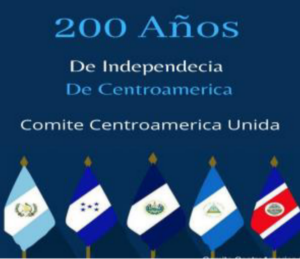
Central American Bicentennial Celebration of Independence
Media Contacts: Contacto de Medios:
Ana Alfaro, Central America United Committee: 860-881-6088; or [email protected] September 1, 2021
WHAT/QUE:
15 September 1821- 15 September 2021
Celebrations Begin on September 3, 2021, with Flag-Raising at State Capitol
El Comité Centroamérica Unidad de Hartford, Connecticut, EE. UU./Central America United Committee commemorates this year’s Central American Bicentennial of Independence with the flag- raising of each country of Central America. Flag-raising will be held at the State Capitol in Hartford at 12Noon. The five countries are: Guatemala, El Salvador, Honduras, Nicaragua y Costa Rica.
El 15 de septiembre de este año los cinco países conocidos hoy como Guatemala, El Salvador, Honduras, Nicaragua y Costa Rica conmemoran 200 años de su Independencia política del antiguo régimen colonialista impuesto por los españoles en esa región ístmica desde comienzos del siglo XVI. El 15 de septiembre de 1821, José Cecilio del Valle, gran jurista e intelectual, nacido en Honduras y radicado en la capital de Guatemala, habiendo redactado la Declaración de Independencia, motivado por movimientos y luchas sangrientas asumidas por miles de pobladores en todas las Américas, y en particular en Mexico, dio a conocer públicamente el famoso documento independentista.
En este año del 2021 los centroamericanos conmemoran su Bicentenario en sus cinco países, 200 años de su Independencia del colonialismo y de su soberanía política ante el resto de las naciones del mundo.
WHERE/DONDE:
The flag-raising of each country will be held at the State Capitol Building, 210 Capitol Avenue,
Hartford – 12Noon
WHEN/CUANDO:
The flag- raising schedule and respective flag is as follows:
- September 3 to 6 (Friday to Monday): Nicaragua
- September 7 & 8 (Tuesday and Wednesday): El Salvador
- September 9 & 10 (Thursday and Friday): Honduras
- September 11 & 12 (Friday and Saturday): Guatemala
- September 13 to 15 (Sunday to Wednesday): Costa Rica
The community is invited to take time from their schedule to honor each country’s flag at the State Capitol. Take photos and share on Social Media.
Background/Historia:
The Central America United Committee is seeking to raise awareness about the rich culture of five countries—Guatemala, Honduras, El Salvador, Nicaragua and Costa Rica—and highlight successful and painful stories about Central American people who migrated to the United States. Its motto is, “Five nations one heart.”
Partners/Asociados:
The Central America United Committee and Trinity’s Center for Caribbean Studies organized this celebration, which is co-sponsored with the Trinity College History Department.
The Center for Caribbean Studies, led by its co-directors, Professor of History and International Studies Dario A. Euraque and Professor of Music and Ethnomusicology Eric Galm, explores and celebrates the distinctive Caribbean character of the city of Hartford and the influence of Caribbean civilization on contemporary cultures around the world, including Central America’s historical and contemporary relations with the Island Caribbean. It conducts collaborative research and hosts cultural events and exchanges that build upon the region’s transnational connections while helping Trinity students develop as engaged global citizens.
Spring 2021 Virtual Events
Thursday, April 29th at 5:30 p.m.
The Center for Caribbean Studies invites you to join a virtual discussion of Aime Cesaire’s classic, Discourse on Colonialism (1952).
The discussion will be hosted by Prof. Emeritus Leslie Desmangles
To view the discussion, Click here
The Center for Caribbean Studies Decoloniality Series
March 30th to April 22, 2021 Via Zoom
This lecture series presents work in progress of a diverse group of scholars at Trinity College who approach the notion of Decoloniality from various disciplines, from philosophy to arts to history.
Tue 3/30. Garth Myers, Director of the Urban Studies Program, and the Center for Global and Urban Engagement, Trinity College, “Edouard Glissant and ‘the Virus of Coloniality.”
Thu 4/1 Prof. Maurice Wade, Philosophy Department, “The Decolonial Thought of Lloyd Algernon Best.”
Tue 4/6 Prof. Janet Bauer, International Studies, Trinity College, “Decolonizing Caribbean Feminism—in Dialogue with Muslim Women.”
Thu 4/8 Prof. Amanda Guzman, Ann Plato Fellow in Anthropology, Trinity College,
& Prof. Pablo Delano, Studio Arts, Trinity College, “Shifting the Gaze of Puerto Rican Representation: the Decolonizing Work of Pablo Delano’s Museum of the Old Colony.”
Tue 4/13 Prof. Eric Galm, Music Department, Trinity College, “Processions of Coloniality: The Central African/Afro-Brazilian Congado and its perseverance.”
Tue 4/22 Prof. Dario A. Euraque, History Department, Trinity College, “The Praxis of Decolonialization and Decoloniality in Historical Context: Central America,”
Thu 4/27 Dr. Christina Bleyer, “Toward a Decolonial Archival Praxis.” Dr. Bleyer is Director of Special Collections and Archives, Watkinson Library, Trinity College.
The series assumes a historicized sense of “colonialism” and typology of colonialism suggested by Jurgen Osterhammel’s classic book, Colonialism: A Theoretical Overview (Osterhammel 1997) That is, it addresses colonialism in its “modern sense” and, in particular, the kind(s) of colonialism(s) in the Americas first initiated by Europeans, beginning with the voyages of Columbus, in the 1490s, with a specific focus here on the Grand Caribbean.
They consider colonialism to be:
“A relationship of domination between an indigenous (or forcibly imported) majority and a minority of foreign invaders. The fundamental decisions affecting the lives of the colonized people are made and implemented by the colonial rulers in pursuit of interests that are often defined in a distant metropolis. Rejecting cultural compromises with the colonized population, the colonizers are convinced of their own superiority.” (Osterhammel 1997, p. 15).
Colonialism is, of course, created and sustained by coercion and outright violence, violence of often horrific proportions. Yet coercion and violence are not colonialism’s only sources of sustenance. Colonialism is also sustained by what current decolonial thinkers refer to as coloniality. And, coloniality persists even when colonialism(s) have ended. A politically independent former colony therefore does not become decolonial simply by virtue of that independence. The collective autonomy that is the aim of anti-colonial struggle, and for which political independence is valued, is incomplete if coloniality is unchallenged, and if different typologies and trajectories of colonialism are homogenized into the ‘epistemic murk’ of a single kind. Neither coloniality nor decoloniality should be understood in a “one size fits all” fashion.
As Nelson Maldonado-Torres explains:
“Colonialism denotes a political and economic relation in which the sovereignty of a nation or a people rests on the power of another nation, which makes such a nation an empire. Coloniality, instead refers to long-standing patterns of power that emerged as a result of colonialism, but that define culture, labor, inter-subjective relations, and knowledge production well beyond the strict limits of colonial administrations. Thus, coloniality survives colonialism. It is maintained alive in books, in the criteria for academic performance, in cultural patterns, in common sense, in the self-images of peoples, in aspirations of self, and so many other aspects of our modern experience.” (Maldonado-Torres 2007, p. 243, emphasis added)
Whatever else coloniality might be, it is clearly an epistemic enterprise that sustains colonialism, and that continues live beyond formal independence, by dominating how colonized and formerly colonized peoples collectively understand themselves, their past(s), their present(s), their future(s), and their aspirations. The lectures in this series illuminate the nature of epistemic coloniality (theory) and to discuss and exhibit means by which it can be challenged (praxis to practice).
February 25, 2020
“A Trip to The Americas: Resistance, Spirituality and the Arts.”
Rev. John Selders, Assistant Dean of Students, Trinity College.
Selders will report on his research last summer in Trinidad & Tobago and Bahia, Brazil on how the music, art, and religion of locals and descendants from the African Diaspora in these countries have served struggles for human rights and political empowerment. Selders and his wife Pamela are co-founders of “Moral Monday CT,” a grassroots organization which gathers voices in the struggle for freedom and justice for black and brown people. They organize at the nexus of Movement for Black Lives and broad base social justice/civil rights movement of the last half-century.
7-9pm, Dangremond Room.
March 3, 2020
“The Haitian Immigrant Experience.”
Marie-Celie Agnant, a celebrated Montreal-based Haitian author. Her two novels, La dot de Sara (1995) and Le Livre d’Emma (2001) highlight issues of the immigrant experience: exile, alienation, bicultural identities, hybridity, and migrant memory. Agnant’s visit to Trinity is co-sponsored with a partnership with the exhibition “Creating Art Dangerously: Art and Revolution” at The Art Gallery, Eastern Connecticut State University. She will be introduced by Leslie Desmangles, Professor of Religious Studies and International Studies, Emeritus, Trinity College.
12:15pm, Dangremond Rooom.
*March 24, 2020
“Images of Disaster: A Case Study In Puerto Rico.”
Tamara Cedré, California State University, San Bernardino.
This talk engages the depiction of disaster in vulnerable communities and posits questions about photography’s ideological currency. We will discuss depictions by local and outsider photographers while generating a discussion of best practices–beginning with a case study in Puerto Rico but also opening up the conversation to other affected areas.
12:15pm, Dangremond Room.
*March 26, 2020
“Forgotten Networks of Power: The Catalan Presence in Havana and other Ports of the Caribbean, 1800-1950.”
Professor Thomas C. Harrington of the Department of Language and Culture Studies, Trinity College.
The Americas have hosted many immigrants since the beginning of colonialism in the XVI. Catalan migration to the Americas has suffered an endemic neglect of these highly consequential migrations. This stems from the inability of most contemporary scholars, people generally trained to perceive human flows in statist terms, to grasp just how different the Catalan experience in the Americas was from that of other Iberian migrants to the new world, including in the Caribbean. Prof. Harrington will report on his research at the extraordinary archives at the Casal Català in Havana, Cuba. These documents pertain to the 19th and early 20th century interactions between the Catalan communities of Cuba and those in New Orleans and other port cities in the Gulf of Mexico and the US South, such as Galveston, Tampa, Tampico, Savannah and Charleston.
12:15pm.
*April 2, 2020
“Con los brazos abiertos? The violence of Deportee ‘Reception’ in Honduras.”
Amelia Frank-Vitale, PhD student, University of Michigan.
Frank-Vitale has research the after lives of Hondurans deported from the U.S. to San Pedro Sula, located 60 miles south of Caribbean Honduras, a transition point of illegal cocaine transshipped from Colombian through Guatemala and into Mexico and the U.S. Frank-Vitale argues that both government and NGO programs dedicated to the “reinsertion” or “reintegration” of deportees in Honduras fail to curtail undocumented emigration precisely because the majority of those who migrate were never “inserted” or “integrated” into society prior to their migration, including those recently immigrating via “the Caravans” since October of 2018. Their exclusion is in fact exacerbated by their criminalization throughout the process of detention and deportation from the U.S.
12:15pm, Reese Room, Smith House.
*April 25, 2020
13th Annual Samba Fest
The 13th Annual edition of this Central Connecticut festival will feature music, dance, and food from Brazil and the Caribbean. Scheduled artists include Brazilian virtuoso 7-string guitarist Yamandú Costa, Afro-Brazilian dancer G’Leu (Gleide) Cambria, Capoeira and Samba dance with Ginga Brasileira, The Trinity Samba Ensemble, Trinity Steel, crafts and activities by Trinity College Student organizations, a mobile library provided by the Hartford Public Library, and much more!
11am-6pm Trinity College Life Sciences Quad.
* These events were canceled due to the closing of the college in March 2020 in response to the Covid-19 pandemic.
Fall 2019
November 11, 2019

Selwyn R. Cudjoe, Professor of Africana Studies at Wellesley College
William Hardin Burnley: The Slave Master of Trinidad
12:00 p.m.
Alumni Lounge, Mather Hall
Read more
November 12, 2019
The Annual George J. Mead ’37 Lecture
Robert A. Hill, Professor Emeritus, Department of History, UCLA
“West Indian Elevator Boy,” Hodge Kirnon of Montserrat: Original Theorist of the Negro Renaissance of the 1920s
4:30 p.m.
Reese Room, Smith House
Read more
